By:
- Tiffany Fox
Published Date
By:
- Tiffany Fox
Share This:
Technology, Energy and Healthcare Luminaries Paint Picture of Future at ‘The Atlantic Meets the Pacific’ Forum
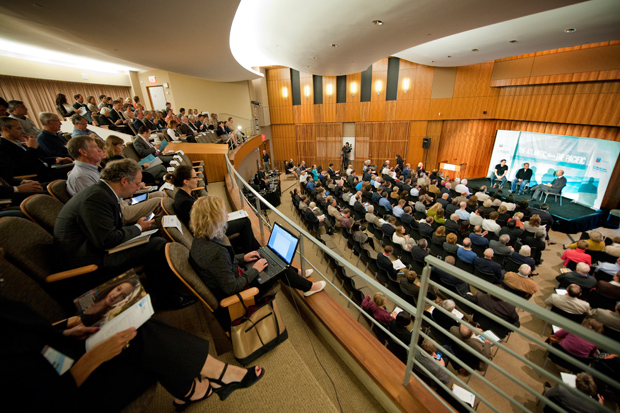
The Atlantic magazine joined forces last week with UC San Diego Extension and acclaimed innovators on the West Coast for an inaugural forum that drew CEOs, venture capitalists, philanthropists and journalists to premiere venues in La Jolla, including the University of California, San Diego.
The first in what is planned to be a series of events called “The Atlantic Meets the Pacific” began Monday evening at the Seaside Forum at UC San Diego’s Scripps Institution of Oceanography, where 300 guests gathered to hear an exchange between The Atlantic National Correspondent James Fallows and CEO of SpaceX and Tesla Motors Elon Musk.
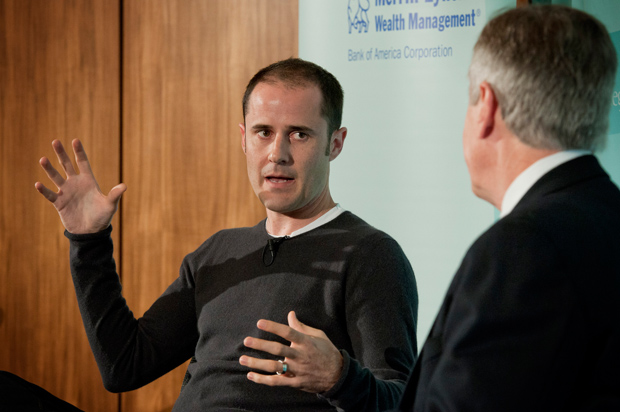
Twitter co-founder Evan Williams (left) fields questions from The Atlantic National Correspondent James Fallows about Twitter's involvement in Iran and China, and the ways the social media platform might be used 'for evil.'
The three-day conference—which follows in the tradition of The Atlantic’s prestigious Aspen Ideas Festival and the Washington Ideas Forum—included subsequent interviews and panel discussions with luminaries from the worlds of energy, technology and healthcare, including Twitter co-founder Evan Williams, spiritual guru Deepak Chopra and Will Wright, designer of one of the most successful computer games of all time.
The event was the brainchild of Associate Vice Chancellor of Public Programs and Dean of Extension Mary Walshok, who felt the time was right for UC San Diego and La Jolla to create a world-class conference series. At the same time, The Atlantic was looking to stake out a position on the West Coast, much as it did in Colorado with the Aspen Festival.
So, it’s no surprise that UC San Diego had its fingerprints all over the program. Attendees got an inside look at Scripps, the UCSD Moores Cancer Center, and the California Institute for Telecommunications and Information Technology (Calit2) for an evening of technology demos and entertainment. Calit2 Director Larry Smarr was a featured panelist, as was Steven Mayfield, director of UCSD’s San Diego Center for Algae Biotechnology, and Susan Shirk, a professor of International and Pacific Studies and director of the University of California Institute on Global Conflict and Cooperation.
One of the biggest draws at the event was Williams, who has largely worked out of the spotlight for more than a decade—a fact that seems counter-intuitive to anyone who has spent time on Twitter, which is notorious for its tendency to bring out the narcissist in its users.
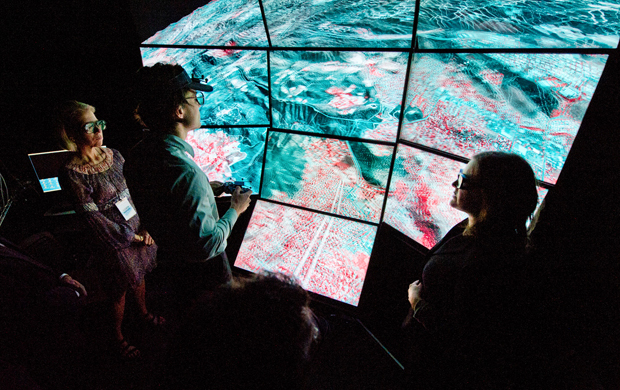
As part of aTuesday evening program, Calit2 Research Scientist Jurgen Schulze (center) and Project Manager Jessica Block (right) demonstrate a 3D visualization of data taken from the 2007 wildfires in San Diego County in the Calit2 NexCAVE.
At 39, Williams’ youthful demeanor and dressed-down sensibility stood out in sharp contrast to Fallows’ buttoned-up seriousness throughout their interview. He described how he got his start on a farm in Nebraska, where he would play with Legos, tinker around in a woodshop and “imagine my empire.” He joked that he never held an office job before starting Blogger and later Twitter, “so I thought I was well-qualified to start a technology company.”
In a testament to how much times have changed, Williams found himself answering pointed questions from Fallows about Twitter’s involvement with the U.S. State Department during the 2009 election protest in Iran, Twitter’s reluctance to establish a presence in China and the ways that Twitter could be potentially used “for evil.”
“All of these systems have unintended consequences, and you intend for it to be used more instructively than destructively,” said Williams of social media platforms like Twitter. “I think of Twitter as a power tool, a table saw. If you're Representative (Anthony) Weiner, you might slip and cut off your finger, but does that mean we shouldn't have table saws?” (Rep. Wiener resigned from Congress earlier this year in the wake of a scandal stemming from a sexually suggestive photograph of himself that he linked to via his public Twitter account.
“In the tech world,” added Williams, “we tend to see the positive outcomes and downplay the negatives. If you were inventing table saws and thought most people were going to cut their fingers off, you probably wouldn't even bother."
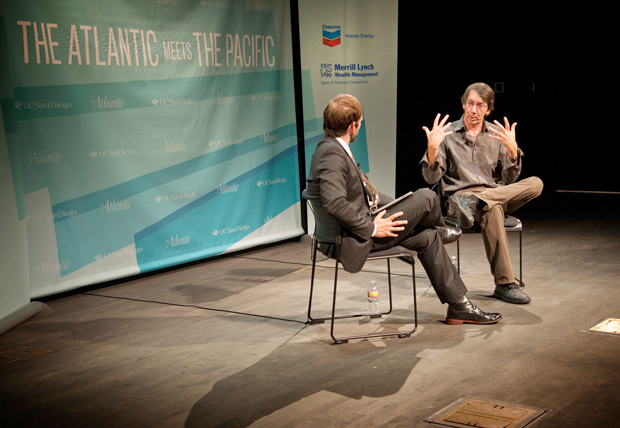
The Atlantic's Alexis Madrigal, a senior editor, interviews game designer Will Wright (right) who emphasized the importance of play in fostering innovation.
Now that Williams’ involvement with Twitter has been self-relegated to a seat on its board of directors, it was rumored that he might reveal his ‘next big idea’ at The Atlantic Meets the Pacific event. But Williams was mum about his new venture with The Obvious Corporation, other than to say, “As long as I’ve been doing start-ups, I’ve never seen more opportunity.”
“The hardest thing about starting something now is trying to focus,” he admitted. “I think we have yet to apply a lot of things the Internet is good at to media. We have lots of ways of tapping into the collective intelligence on the Internet to help people get smarter, but there's little to help us tap into what we really care about. People know the pace of (technological) change is phenomenal, but people still accept the status quo. Thinking bigger, demanding more and setting a higher bar is what I would encourage."
There’s no indication that Williams was tweeting during the event—and if he was, he wasn’t using the official event hashtags: #AtlanticMeetsPacific and #TAMTP. It seems he might have been in good company—the audience was filled primarily with Baby Boomers (including local notables Malin Burnham, Denny Sanford and Buzz Wooley) rather than the Gen X Twitterati who typically turn up for similar sci-tech events.
But that also means the audience was the perfect target demographic for Calit2 Director Smarr’s remarks during the “Exploring Technology” session. The panel focused primarily on his 10-year quest to improve his health and “quantify” his body by wearing a suite of devices that measure caloric burn, sleep and other variables. Smarr also has his blood regularly analyzed for 30-40 measurements, which over time can provide “biofeedback” on his state of wellness. Smarr was also an early adopter of consumer genomic analysis.
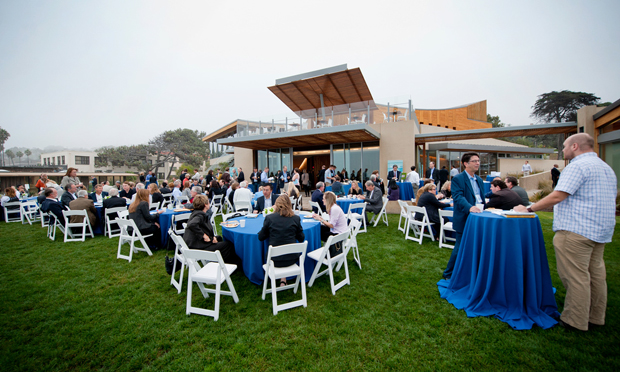
The first in what is planned to be a series of events, 'The Atlantic Meets the Pacific' took place at premiere venues in La Jolla, including the Seaside Forum at UC San Diego's Scripps Institution of Oceanography.
Similar products and devices—such as weight scales that transmit their readings to physicians via wireless connections—are also the subject of a story in The Atlantic’s current issue by writers Adrian Slywotzky and Tom Main titled “The Quiet Health-Care Revolution.”
"The thing we know the least about is the inside of our body, and that's just nuts,” remarked Smarr during the panel, which also featured Shirk and Peggy Johnson, president of Global Market Development at Qualcomm, Inc. “It's like the way we used to diagnose problems with our cars—smoke would come out of the hood. That's like having a symptom.
“Genomic sequencing is one million times cheaper than it was in 2000,” he added. “Doctors today don't use your genetic data and yet the medical students of the future will assume that they'll have access to their patients' full genome. We've got to train a whole new generation of medical professionals who are comfortable with this massive wave of new technologies. The current community doesn't have a way to put these technologies in place."
The downside of entrenched routines and behaviors that stymie innovation was a theme throughout the conference, and in particular during Senior Editor Alexis Madrigal’s interview with the game designer Will Wright. Wright, who co-founded the game development company Maxis and later went on to design The Sims (the best-selling PC game in history), also discussed the changing nature of technology and emphasized the role of “play” in fostering innovation.
“Some of the best education is failure-based,” said Wright, “Games are unique in that in some sense, they celebrate failure. You have to pick up the controller and experiment. That's really what play is about."
Wright mentioned that his 18-month-old son learned how to use an iPad within six months on his own, with no help from Wright. "He would fail 10 times and then succeed, fail 10 times and then succeed. That's instinctual to us."
It may be instinctual to fail, but it’s also frowned upon in what Wright calls our society’s “factory model” for education. Play is starting to be emphasized in Maker’s Faire-type courses that emphasize do-it-yourself projects and process over results, said Wright. But, he added, American universities still have a long way to go before they become the driving force for innovation that they aspire to be.
"Of course, the notion of play is resistant to standardized testing, but as soon as we start seeing the walls, we can move them,” he noted. “Many kids have to (pursue their passions) on their own or outside of school. It's unfortunately an aspect of our society that's going to take longer than others to change."
Share This:
Stay in the Know
Keep up with all the latest from UC San Diego. Subscribe to the newsletter today.



